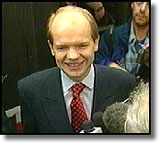
|
Hague Fights Back in ScotlandThe new Tory leader William Hague inspected his party's still shell-shocked Scottish troops, pledged an end to Tory "arrogance" and completed appointments to his shadow cabinet."We are now going to fight back - and I am going to lead the fightback," he said in Glasgow. The move was seen as underlining his determination to try to start reviving Tory fortunes throughout the country. He promised a fresh image and message for the Tories but gave no sign that any rebirth would be so radical as to drop their opposition to Scottish devolution. "I think what we said about the dangers of devolution are true. It doesn't stop being true because of the general election," he told reporters as he emerged from the train. Asked if "arrogance" played a part in his party's electoral troubles in Scotland and elsewhere, he declared: "Whatever the feeling about that, certainly as far as I am concerned arrogance is finished in the Conservative party. His most ardent supporters during the leadership campaign were expected to join Peter Lilley, Michael Howard, John Redwood and Stephen Dorrell in the new opposition team. Mr Hague took the overnight sleeper train to Glasgow where he was meeting Scottish Party officials to discuss how to boost the party north of the border, where the Tories no longer have any MPs. By visiting Scotland, where there have even been calls from some quarters for members to split off as a separate entity, Mr Hague was beginning his task of healing his shattered party in the place where the Conservative cause is in most need of new vigour. He wants to demonstrate there are no "no-go zones" for his brand of Conservativism. The deputy chairman of the Scottish Conservative Party, Jackson Carlaw, said it would be "an uphill struggle" and "a long fight" to rebuild morale north of the border. "I think we certainly will have to evolve a policy agenda which is relevant to the people of Scotland and to have an organisation which is capable of winning again," he told BBC Radio 4's Today programme. "Plainly, with no councils, no Euro-MPs and no members at the Westminster parliament, we don't have an organisation which is effective at winning, so we are going to have to do that," explained Mr Carlaw. "We also need to attract a different generation of people to support the party and that is what William Hague will be very good at," he claimed. But Scottish National Party leader Alex Salmond said: "William Hague may be visiting Scotland but he leads a party which represents only the shires and suburbs of England." "He was rejected by 80% of Tory party chairmen in Scotland and was elected without a single Scottish vote being cast. Under his leadership, the Tories seem set to continue being an anti-Scottish party," claimed Mr Salmond.
Former party chairman Dr Brian Mawhinney has been given the job of shadow Home
Secretary and former Education and Employment secretary Gillian Shephard becomes Shadow Commons leader. Sir George Young is Shadow Defence secretary.
There is a surprise return to the frontbench for Sir Norman Fowler, who many
thought had bowed out of frontline politics. He is given the environment,
transport and regional brief.
As promised, there is a pro-European element to the new shadow cabinet, with
Kenneth Clarke's campaign manager David Curry awarded the post of Shadow
Agriculture Minister.
But the arch Eurosceptic Iain Duncan-Smith is also included - the first of the
1992 Tory intake to reach the top front-bench level. He will be Shadow Social
Security Secretary.
Former minister Francis Maude, who originally supported Michael Howard in the
leadership race but switched to Mr Hague, becomes Shadow National Heritage
Secretary.
Andrew Mackay becomes shadow Northern Ireland Secretary and John Maples Health Spokesman. James Arbuthnot becomes Chief Whip, Lord Strathclyde Chief Whip in the Lords and Lord Cranborne Shadow Leader of the Lords.
The new appointees join Michael Howard, Peter Lilley, John Redwood, Stephen
Dorrell and Lord Parkinson, who were all given key posts on Friday June 20.
A Conservative source stressed that today's appointments reflected opinion
across the party and that no former member of the front-bench team had been
sacked.
He said: "There is a proper balance across the party spectrum. There is a
place for other leadership candidates who wanted one. Everyone accepted the
first job they were offered."
Two former Cabinet ministers, John Gummer and Douglas Hogg, are not included in
the shadow cabinet. Both had supported Mr Clarke's leadership campaign.
But the Conservative source insisted that no former member of the temporary
shadow cabinet led by John Major had been deprived of a job without their
consent.
"There were no sackings," the source insisted.
Mr Clarke, Michael Heseltine and Virginia Bottomley, all members of the
previous Cabinet, had all indicated that they wanted to return to the
backbenches.
|
Diana, Princess of Wales, 1961-1997
Conference 97
Devolution
The Archive
News |
Issues |
Background |
Parties |
Analysis |
TV/Radio/Web
Interactive |
Forum |
Live |
About This Site
News |
Issues |
Background |
Parties |
Analysis |
TV/Radio/Web
Interactive |
Forum |
Live |
About This Site
© BBC 1997 |
politics97@bbc.co.uk |
